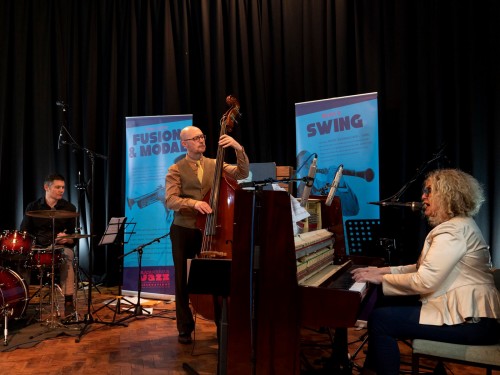
by Ian Mann
August 07, 2021
/ LIVE
Guest contributor Nigel Jarrett enjoys pianist / vocalist Wendy Kirkland's tribute to jazz’s piano divas, the women who play the piano and sing at the same time.
Wendy Kirkland Trio, “Celebrating the Divas”, The Barn, White House Farm,
Llanvetherine, Monmouthshire, 05/08/2021
Part of Wall2Wall Jazz Festival
Wendy Kirkland (keyboard, vocal); Pat Sprakes (acoustic bass); Steve Wyndham (drums).
Being a consummate one herself, UK jazz pianist and singer Wendy Kirkland is generous to a fault in proclaiming the virtues of jazz’s piano divas, the women who play the piano and sing at the same time – or played and sang, if we are to trawl the archive for legends no longer with us. The choice of terms is important too: for her at least, the playing comes first and the singing afterwards, not in the musical sense of course – they come together at the same time – but in establishing priorities that might otherwise downgrade the playing to mere accompaniment.
Some of these women are well-known, others not, as Kirkland inferred at the penultimate gig of Black Mountain Jazz’s week of live music at The Barn, Llanvetherine, in deepest Monmouthshire. Like all the other acts in the week, her trio had filmed a session at the Melville Centre in Abergavenny ready for streaming in the autumn as BMJ’s virtual Wall2Wall Jazz Festival. She was paying homage to the playing-singing distaff side in a recall of her much-praised first album, “Piano Divas”, recorded with a quartet and issued three years ago.
Among the lesser known divas is Dena DeRose. Kirkland referred to her as among the musicians who had covered Peter Nero’s “Sunday in New York” of 1964. Shirley Horn,
among the better known, also recorded a version. The Kirkland trio’s account was evidently arranged by her as not so much a labour of love as an opportunity to celebrate. It included some tasteful breaks by drummer Steve Wyndham, but more about him later.
Kirkland helpfully spelled out DeRose’s name for an audience member who didn’t catch it and explained that the American was now a professor at the University of Music and Dramatic Art in Graz, Austria. (Interestingly, some encyclopaedias describe both Horn and DeRose as American jazz pianists; DeRose concentrated on singing after problems with her hands.)
That Kirkland is a pianist-singer, not a singer-pianist, is soon established. She will sing the ‘head’ (main theme) of a song with its appendages and then launch herself into a line of keyboard choruses, sometimes scatting in unison with her right-hand figurations. Scatting vocalese is thus an extension of the instrumental and a further emphasis on it. Her trio becomes a piano trio, with bassist Pat Sprakes (otherwise an elegant guitar stylist who played that instrument on the “Piano Divas” album), and Wyndham revelling in the opportunities for swinging a melody. It swung to a different beat in a samba version of “Bluesette” by Belgian harmonica-player Toots Thielmans, part of his “The Brasil Project” and enshrined in the eponymous album of 1992. Kirkland celebrated women arrangers too, notably the Canadian Carol Welsman, in Frank Loesser’s “Slow Boat to China”. And in opening with Brooks Bowman’s “East of the Sun (and West of the Moon)”, she acknowledged another Canadian pianist-singer, Diana Krall, as her first and direct inspiration. To underline it, there was a Krall version of Peggy Lee’s “I Love Being Here With You”.
The Kirkland diva style is hip-sophisticated, her delivery close-miked and intimate, as in “Don’t Let the Sun Catch you Crying”, a blues lifted from a Ray Charles album by Robben Ford (Ford’s own delivery anything but raw), and the corroborating “I’m Hip” by Blossom Dearie from the album “Blossom Time at Ronnie Scott’s”, a piece of faux-self mockery, reminding the Monmouthshire audience that Kirkland and Sprakes had already played a sold-out gig at Scott’s this year and were about to do the same there on Monday. The duo as composer/lyricists (Sprakes etched the chords, Kirkland wrote melody and words) was responsible for “Travelling Home”, a track from the second Kirkland album,” The Music’s On Me”, and here dedicated to all performing jazz musicians who have struggled through lockdown and are now getting back to doing what is their reason for being. The two were also responsible for one of the evening’s magic moments, a version of Kenny Rankin’s “Haven’t We Met” on to whose torso was grafted first the opening of Jimmy Van Heusen’s “Here’s That Rainy Day” and at the end, the chordal theme of Wes Montgomery’s “Full House”.
The point about that last mélange of charts was its homogeneity, and the point about the Kirkland trio was its deceptive effortlessness. Sprakes and Kirkland, a husband-and-wife team, read each other fluently but it was Wyndham’s drumming – nuanced, fastidious, and laden with brushwork – which sharpened a tune’s definition and anticipated where his colleagues were taking it. As a vital but unobtrusive component in what Kirkland is about – and it’s something finely honed and easy on the ear - his contributions couldn’t have been bettered.
Divas are celebrated singers, typically operatic and of mercurial temperament. Most of those celebrated by Kirkland are, or were, too cool to blow hot and cold. That’s jazz for you.
NIGEL JARRETT